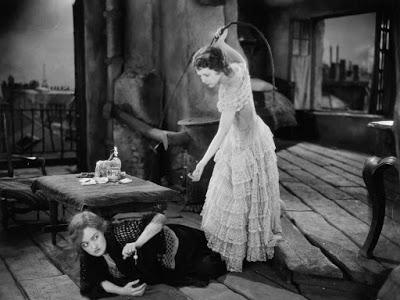Format: DVD from NetFlix on rockin’ flatscreen.

Despite the fact that I’ve watched a bunch of them, I still tend to find silent films difficult. Silent horror films are interesting and plenty of silent comedies are still funny. But silent dramas? They’re a whole different thing. There’s always a little part of me that dreads them a little when they show up. This might be only the second new-to-me silent film I’ve seen this year. Seventh Heaven showed up from NetFlix only because I forgot to rearrange the queue when I sent the last film back, so I can’t admit that I was looking forward to it or actively chose it. But I’d have to watch it eventually, right?
Straight off, there are going to be issues here for me. One of our two main characters, Chico (Charles Farrell) admits early in the film that he is an atheist. That’s a huge red flag for me that we’re going to be mired at least some of the time in religious foofaraw. Not many atheists maintain that position in a Hollywood film, and that was far more true back in the day than it is now. So I can guess where Seventh Heaven is going to go eventually within the first couple of minutes.
Chico works in the sewer in Paris but feels that he’d be much better suited as a street cleaner since a remarkable fellow like himself deserves to be in the sun and around people. Around the same time, Diane (Janet Gaynor) finds herself abused once again by her sister Nana (Gladys Brockwell), who demands that Diane go out and get her some absinthe. While she is out, Nana is told that her aunt and uncle have returned from the tropics as wealthy people and want to take them back. However, since Diane is unable to tell them honestly that she and her sister have been “good” (read: they’ve been working as prostitutes), they are refused. Nana starts to beat Diane again and chases her into the street where she is rescued by Chico.
Shortly after this, the police walk by, having rounded up a bunch of petty criminals, including Nana. Nana demands that they take Diane as well, but Chico vouches for her, claiming that she is his wife. Knowing that the police will investigate, Diane comes to live with him in his top floor apartment (the seventh heaven of the title) until the police show up. They do, but at this point, Chico has more or less gotten used to Diane and invites her to stay.
Love slowly blooms between the two as their living arrangements become something more than just convenience. But we can’t just have them be happy. This is a silent romance/drama, so something has to come between our two lovers who finally admit their love to each other. That thing is World War I. Chico signs up right away to protect France and Diane. With Chico gone, Nana returns to torment Diane, and of course there’s always the danger of Chico, you know, being at the front and in the trenches in World War I.
This was the first on-screen pairing of Janet Gaynor and Charles Farrell, who would make something like a dozen movies together. Farrell is a pretty good leading man for the time—tall, good-looking, sturdy—but it’s Janet Gaynor who steals the film. This is entirely her film from the moment she first appears on screen until the last frame. It’s interesting to note that in those first Oscar years, people frequently got multiple nominations in the same category. There were five Best Actress nominations for the first Oscar ceremony and three of them belonged to Janet Gaynor.
Seventh Heaven is early filmmaking, of course, so there’s not a lot here that I haven’t seen multiple times. There is, however, a truly magnificent tracking shot that undoubtedly stretched the technology for the time to the limit. When Chico and Diane first walk up to Chico’s apartment, the camera follows them from the ground all the way to the top floor, with people in apartments along the way acting as if they actually live there. It’s a great shot to give a sense of the building and the place, and I’m certain that it’s one of the main reasons Frank Borzage earned a nomination for this film (and won for the first and only Oscar for Best Director of a Dramatic Picture).
And while the religious nonsense does show up eventually as I knew it would, I give the film credit for making Chico a genuinely nice guy despite what would have to be the common opinion of atheists at the time (and for many up until the present day).
I wouldn’t choose to watch Seventh Heaven again. It does get pretty drippy by the end, but definitely has some real merits.
Why to watch Seventh Heaven: More Oscar nominations than any other film at the first Oscars ceremony.
Why not to watch: Silent dramas and silent romances are almost always a tough watch.
